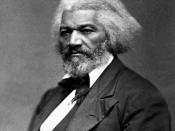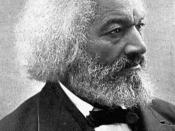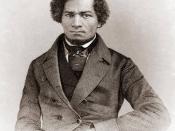Race relations, especially between blacks and whites, have always been a
problematic and fiery issue throughout United States' history. Frederick Douglass was a
self-taught black man who wrote about his experiences as a slave. In his book, "From
Narrative of the Life of Frederick Douglass, an American Slave", he makes many brilliant
depictions and insights into the injustices and cruelty of slavery. In 1863, Lincoln
announced the Emancipation Proclamation and blacks were forever freed from slavery.
However, this did not put an end to racial tension or to the black man's hope for racial
equality. One hundred years later, segregation was the prevailing system, a system not
nearly as cruel as slavery, but still it was evil and of great hardship to the twentieth century
black man. Martin Luther King Jr. wrote a letter from jail justifying his "nonviolent"
crusade to end segregation forever. King's letter is through and his ideas and arguments
are expressed efficiently with well-grounded rationale.
Douglass is more difficult to
understand because there is much more substance under the surface of his writing.
Although they are separated by a century, Douglass and King parallel each other
significantly. King's rhetoric and system of analysis are a helpful lens1 through which to
scrutinize and extract the important realizations dwelling in Douglass's story.
Both King and Douglass describe a predicament in which they face a clash
between white man's law and moral law. Douglass tells a story of his personal experience,
whereas King is more concerned with making his points and backing them up with his
concrete examples.
King is more descriptive, more scholarly in his writing considering he was formally
educated and more exposed than Douglass who was born a slave. King thought laws
prohibiting a black man from sitting in the white section of the bus...


